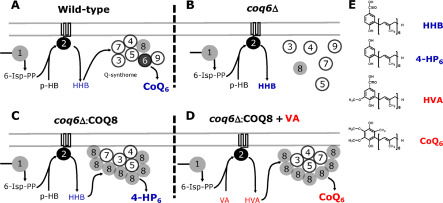Elsevier,
SLAS Discovery, Volume 25, 1 March 2020
Coenzyme Q10 (CoQ10) deficiency syndrome is a rare disease included in the family of mitochondrial diseases, which is a heterogeneous group of genetic disorders characterized by defective energy production. CoQ10 biosynthesis in humans requires at least 11 gene products acting in a multiprotein complex within mitochondria. The high-throughput screening (HTS) method based on the stabilization of the CoQ biosynthesis complex (Q-synthome) produced by the COQ8 gene overexpression is proven here to be a successful method for identifying new molecules from natural extracts that are able to bypass the CoQ6 deficiency in yeast mutant cells. The main features of the new approach are the combination of two yeast targets defective in genes with different functions on CoQ6 biosynthesis to secure the versatility of the molecule identified, the use of glycerol as a nonfermentable carbon source providing a wide growth window, and the stringent conditions required to mark an extract as positive. The application of this pilot approach to a representative subset of 1200 samples of the Library of Natural Products of Fundación MEDINA resulted in the finding of nine positive extracts. The fractionation of three of the nine extracts allowed the identification of five molecules; two of them are present in molecule databases of natural extracts and three are nondescribed molecules. The use of this screening method opens the possibility of discovering molecules with CoQ10-bypassing action useful as therapeutic agents to fight against mitochondrial diseases in human patients.
Elsevier,
3rd March 2020
In 2017, Chioma Blaise Chikere was awarded the second prize of the Green and Sustainable Chemistry Challenge. Her project “Eco-restoration of crude oil-polluted land in Nigeria” demonstrated how organic nutrients such as garden fertilizers and animal excreta can be used to degrade hydrocarbons, cleaning up the soils heavily contaminated by decades of oil spills and advancing SDGs 6, 13 and 15. Three years later, we caught up with Dr. Chikere to learn about her research journey.
Elsevier, Heliyon, Volume 6, February 2020
Background: Pregnancy is characterized with several physical and mental changes in women. These changes cause mental health problems in pregnant women and especially in nulliparous women. Objective: To determine the effects of cognitive-behavioral counseling on mental health of pregnant women. Method: The study was carried out as a quality of life clinical trial with a control group. The participants were 60 pregnant women (less than 20 weeks) who visited Kamyaran-based health centers (Iran) in 2018. The participants were allocated randomly to experiment and control groups (n = 30 each).
Elsevier, eTransportation, Volume 3, February 2020
Various studies have shown that maritime sector needs increased use of zero emission vessels in service by 2030 in order to achieve an absolute reduction in CO2 emissions of 50% by 2050 (consistent with a 2 °C pathway). These vessels, with operational emissions containing zero or negligible greenhouse gas share, would need to represent a significant portion of newbuilds from that point onwards.
Elsevier, One Earth, Volume 2, 21 February 2020
Despite global policy commitments to preserve Earth's marine biodiversity, many species are in a state of decline. Using data on 22,885 marine species, we identify 8.5 million km2 of priority areas that complement existing areas of conservation and biodiversity importance. New conservation priorities are found in over half (56%) of all coastal nations, including key priority regions in the northwest Pacific Ocean and Atlantic Ocean.
Elsevier, One Earth, Volume 2, 21 February 2020
The Sustainable Development Goals (SDGs) were designed to address interactions between the economy, society, and the biosphere. However, indicators used for assessing progress toward the goals do not account for these interactions. To understand the potential implications of this compartmentalized assessment framework, we explore progress evaluations toward SDG 14 (Life below Water) and intersecting social goals presented in submissions to the UN High-Level Political Forum.
Elsevier, World Development, Volume 126, February 2020
With the increasing importance of ‘emerging powers’ in the global economy, questions are raised about the role of developing countries in shaping global norms. The assumption in much of the literature has been to see global norms as originating in the ‘North’ (or the ‘West’). Recent research has begun to challenge this view. This paper contributes to this debate in studying the agency of the South in the adoption of sustainable development as the consensus framework for international development (SDGs).
Elsevier, The Lancet Global Health, Volume 8, February 2020
Background: Innovative solutions are required to provide mental health support at scale in low-resource humanitarian contexts. We aimed to assess the effectiveness of a facilitator-guided, group-based, self-help intervention (Self-Help Plus) to reduce psychological distress in female refugees. Methods: We did a cluster randomised trial in rural refugee settlements in northern Uganda. Participants were female South Sudanese refugees with at least moderate levels of psychological distress (cutoff ≥5 on the Kessler 6).
Elsevier, The Lancet Psychiatry, Volume 7, February 2020
Background: Evidence on the effectiveness of psychological interventions for women with common mental disorders (CMDs) who also experience intimate partner violence is scarce. We aimed to test our hypothesis that exposure to intimate partner violence would reduce intervention effectiveness for CMDs in low-income and middle-income countries (LMICs).


